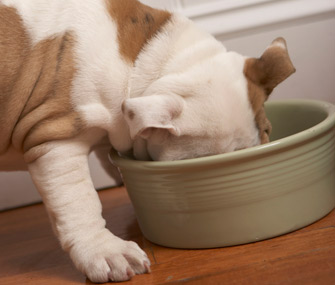Why Does My Dog… Guard His Food Bowl?
Published on July 12, 2012
Skip To

But if your dog bears his teeth whenever someone gets too close to him during feeding time, it’s likely the result of past experiences.
Why Some Dogs Do This
“When I see this behavior, it’s typically in dogs who were rescues, strays or from puppy mills,” Dr. Overall says. “On the street, dogs have to protect their food from other dogs or else they’ll starve. Same goes for puppy mills — breeders will put one dish down for all the animals, and they have to fight to eat.”Dogs can also get temperamental around food if they’re experiencing pain.
“If your dog is ill or broke a tooth, and can’t eat as quickly as he used to, it might cause him to growl if another dog in the house eats it before he has a chance,” Dr. Overall says.
If you notice a sudden change in your dog’s behavior — for example, he goes from sweet to sassy during dinnertime — make sure that you get him to a vet to rule out any potential underlying medical conditions.
What You Can Do to Curb the Behavior
Obviously, having a snappy dog come mealtime isn’t ideal, particularly if you have young children in the house. Luckily, there are ways to calm your canine — and gain his trust.According to Dr. Overall, you can start by setting out three or four bowls of water and small amounts of dry food around the house, so your dog understands that there’s an abundance of it and he doesn’t need to worry about not getting his share.
While he’s eating, you can try to sit near him — at a safe distance — without making any sudden movements. At the same time, you can add a little food to his dish, so he knows that you’re there to give him food, as opposed to take it away.
Dr. Overall says that these are all good bonding experiences that build trust over time.
What You Should Never Do
Finally — and most important — do not take food away from your dog. Ever.“Surprisingly, people think they should be able to give and take away food from their pet whenever they want, with no consequences,” Dr. Overall says. “But how would you like it if you went to a nice restaurant and the man at the table next to you leaned over, cut a piece of steak off your plate and ate it?”
It’s important to point out that these tips are only meant for adults who interact with dogs — children should be taught to respect pets and not bother them when they’re eating.
If you have a particularly aggressive dog, Dr. Overall recommends putting the pet behind a locked door or gate when it’s time to eat. “It’s just better to be safe than sorry," Dr. Overall says, "until children are old enough to learn not to disturb or unintentionally scare the dog.”
Of course, always speak with your own veterinarian about any significant health or behavior issues.





